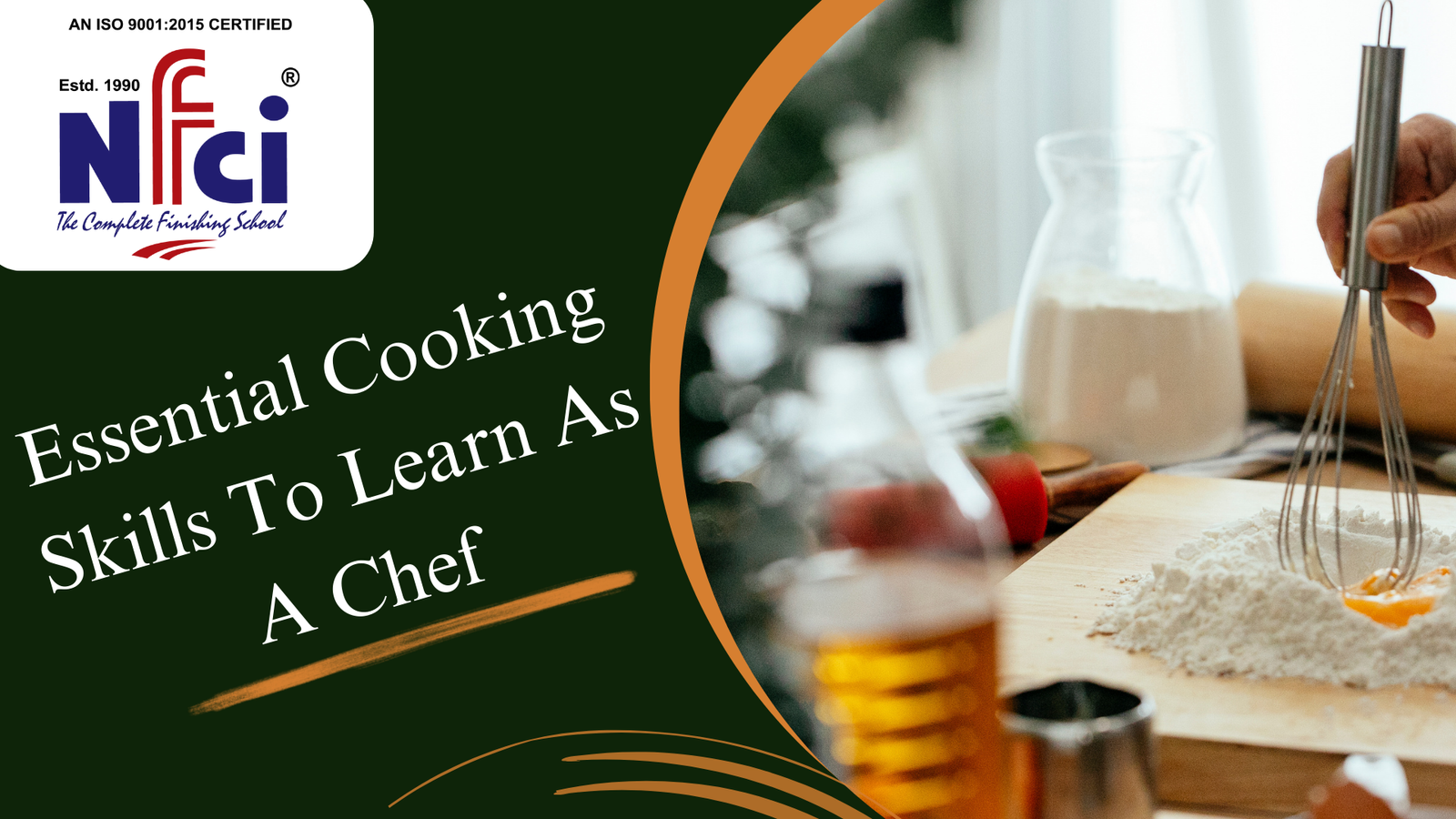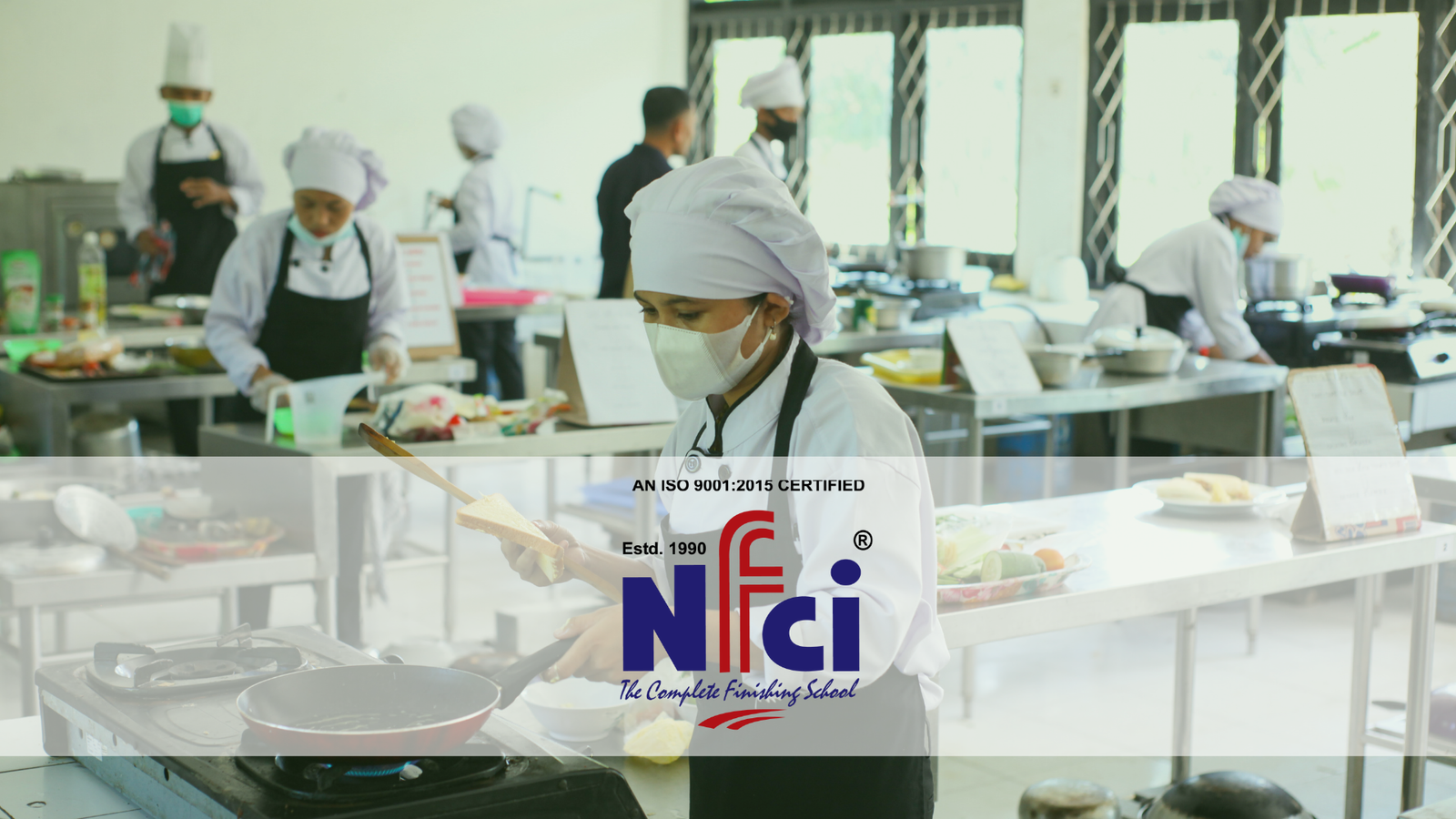
15 Plus Bonus Essential Cooking Skills To Learn As A Chef
Growth follows when you cultivate curiosity and adaptability to learning things. And it is like adding a feather to your cap.
Every time you master a new technique or refine your current expertise, you add proficiency to your collection of know-how. Every professional, including an aspiring chef like you or a student preparing to become a chef, needs to grasp certain elements that form the strong foundation of their growth journey and upgrade cooking skills.
These skills not only empower but lead you on the path to a successful career.
No matter whether you are a seasoned pro aspiring to climb the ranks or a budding chef looking to enhance your culinary practice, you need to pep up yourself with the essential cooking skills to propel your career to greater heights.
Therefore, for your better understanding and convenience, we have divided the entire skill list into three distinct categories. Feel free to explore it all.
Fundamental Culinary Skills One Must Work

1. Mastering Knife Skills Cooking Skills
If you are not familiar with the art of using the culinary blade, you simply cannot survive in the demanding kitchen environment. Any cooking style, without a solid knowledge of cutting techniques is incomplete. It is the foremost aspect or a basic principle of culinary expertise. From chopping, scoring, shearing, dicing, slicing, and julienning with precision to getting your grip stronger on the knife, widening your knife knowledge ensures uniform cooking and appealing presentation.
2. Boiling And Blanching Cooking Skills
Boiling and blanching is one of the essential part of cooking skills. Kitchen skills is learning the delicate art of boiling and blanching. This technique might seem basic to you at first glance, but is more than just putting a water-filled pot to heat. Mastering different boil ranges – rolling, slow, and simmering, cooking delicious and perfectly textured dishes remains no longer burdensome. On the other hand, blanching involves brief boiling followed by a quick plunge of cooling. This technique is crucial for mastering the essentials of cooking pasta, vegetables, stocks, broths, poached eggs, fish, and more.
3. Temperature Control Cooking Skills
Missing out on understanding temperature is the biggest mistake you can make in the culinary profession. It is one of the basic cooking skills to nail when in the kitchen. Whether it’s boiling, simmering, or baking, precise temperature control ensures you unlock the full potential of the ingredients and cook the dish to perfection. This technique will help you in various cooking styles, particularly for dishes that require a fine and delicate balance. Baking is another realm of cooking where temperature control can make or break the flavor.
4. Baking and Steaming Cooking Skills
If your interest particularly gravitates to the sweet shelves of confectionery, learning baking is the best thing you can do. You don’t need to have a culinary degree to become proficient in this art; all you need is a basic understanding of how to cook food in an oven on dry heat until it reaches the perfect golden crust. Steaming, on the other hand, is considered one of the healthier cooking method that preserves the natural taste and nutrients of ingredients. Cooking skills like baking and steaming is crucial for using the technologies for the testier and perfectly cooked food.
5. Sauce Making Cooking Skills
Sauces are another essential element of making tasty food. To pull these off, you need not cram the classic French and Italian etiquettes but understand the fundamentals of emulsification, reduction, and balancing flavors to turn a dish from ordinary to extraordinary. Drizzle and delight it over your streak or add boiled pasta to it, and you will totally enjoy these delicacies on your dining.
6. Roasting & Frying are Important Cooking Skills
Learning to roast is the secret essential cooking skill to making crispy vegetables. Typically done in the oven, open flame, or other electronic devices, this dry-heat cooking process is done at at least 300 °F (or 150 °C). Frying, whether deep or shallow, adds a unique mix of both outer crispiness and interior juiciness to cooking chicken, pork, fish, and vegetables. Both methods can take away the goodness of the food if not done properly.
7. Sauteing & Seasoning Cooking Skills
Contrary to roasting, sauteing is a fast process often done at medium-high flame with a minimal amount of oil compared to frying. Despite that, the results achieved are marvellous and commendable. Ideal for creating delectable vegetables, chicken breast, and more, with a great knowledge of seasoning with salt, pepper, herbs, or spices, enhances the overall flavour while keeping all the ingredients moist and tender.
Specialized Culinary Skills

8. Mastering Five Sauces
Creating silky sauces that add a flavourful blast of taste to your basic dishes. Learning the traditional five mother sauces – Hollandaise sauce, Espagnole sauce, Tomato sauce, Bechamel sauce and Veloute sauce, is the major thing you can’t miss out on. Once you get familiar with the nitty-gritty of these amazing emulsions, you open for yourself a vast world of flavours, textures, and consistencies.
9. Being An Egg Expert
Eggs seem intimidating from a chef’s perspective. And for very rightful reasons. It is one of the cooking skills that goes beyond just serving boiling and scrambled eggs on the plates for breakfast or brunch. In fact, they play a versatile role in a chef’s culinary repertoire. From separating their whites from yolks to expertly executing poaching, frying, and creating delicate custards, they form the backbone of various dishes.
10. Melting Chocolate
Using a double boiler is the key to achieving shiny and silky chocolate melt. It is a game of precision that requires careful attention to detail to prevent it from being burnt down or overheated. Its role in creating a variety of desserts, confections, and chocolate coatings is undeniable. It is more than just a flavour enhancer and acts as a foundation for making truffles and chocolate-covered fruits.
11. Kneading Dough
When you master the skill of kneading dough, you open yourself up to preparing various delicacies like bread (loaf and flat), pizza base, or pastry. Learning the precise techniques of gluten development, texture and structure, fermentation development, and the timing to rise and increase volume, educates you about the entire bread-making stages. And the result, you ask? A perfect batch of baked goodness out of your oven straight.
12. Making Stock
Creating a flavourful stock lifts up the basic nature of your soups, stews, risottos, and sauces. It is a great culinary skill that involves the boiling technique in practice. All you need to do is place some bones, vegetables, and aromatics in cold water, heating it to a gentle simmer to extract their essential flavours. Make sure to cook it for 3-4 hours and skim off any unwanted protein scum that rises to the surface. Strain and boil it till desired.
13. Preparing Gravy
Silky and velvety gravy is a cooking skill welcomed wholeheartedly at every dining table. Making it from scratch requires not a lengthy and overwhelming list of ingredients but a few simple elements like drippings, broth, and flour. Despite having multiple ways to prepare it, honing the art of balancing fats, liquids, and flavour is the key to making it thicker and glossier.
14. Cooking Pasta
The first step to learning to cook pasta properly involves boiling it till al dente (boiled until softened, but still firm and not gushy), followed by figuring out the water-to-pasta ratio and timing. No matter how simple it may seem, learning its science to prevent it from sticking and pairing a sauce that compliments its texture is imperative for you as a professional. Keep in mind that every pasta shape has a different cooking time.
15. Roasting Chicken
Learning to roast chicken to perfection, so that you can both serve and relish on Sunday nights roast is a must. It is a lot easier than you might perceive. You can even try stuffing it with herbs and citrus for a flavourful and juicy paradise. Cooking it in a preheated oven at 350°F is the ideal internal cooking temperature. You can even try it on other poultry and even meats. Once done, nibble it on with some roasted vegetables and enjoy a satisfying meal.
Bonus: Professional Cooking Skills and Techniques
Although we’ve covered the fundamental abilities that anyone hoping to work in the field or currently employed in it should never undervalue, there are a number of other professional factors to instil in your personality. Pepping up yourself with the same sets you apart from the competition.
So, if you are here to turn your dreams into reality and equip yourself with the necessary armour, make sure to not take the following aspects for granted.
-
Kitchen Management
When you’re in a professional kitchen, you cannot afford to overlook all kitchen aspects in a busy environment. Planning communication, and organising form the basics of smooth and efficient operation.
-
Attention To Detail
One of the crucial cooking skills if you are in the forming stage of your career. From noticing and addressing small aspects to ensuring precision in measurements and presentation, ensures excellence and consistency.
-
Being In Discipline
Kitchen discipline holds great significance to your culinary goals. Adhering to culinary standards, rules, and routines is crucial to show your commitment to the profession. This introduces order and efficiency in how you operate.
-
Continuous Learning
Continuous learning reflects your commitment to your craft. Staying up to date with emerging techniques, ingredients, and trends, keeps your inner chef innovative and adaptable. You tend to bring fresh ideas to your work.
-
Plating Creativity
Cooking food is one thing but giving an artistic outlook to your dish is another major dimension to culinary mastery. It does not only make your dish visually appealing but brings your inner artist’s creativity and flair out.
-
Food Sanitation
Cleanliness and hygiene go hand in hand with your culinary profession. It is a non-negotiable trait you can’t compromise on. From proper handling and storage of your food to proper ingredients disposal, it takes care of every food safety aspect.
NFCI: A Rightful Place To Hone All These Skills
While there might be numerous considerable options out there, finding yourself cooking skills enhancing hub that can prepare you for the culinary world is crucial to upskilling your culinary game. And getting yourself enrolled at NFCI Hotel Management Institute is the ideal decision you can make.
We have built career: Look at the words we got from students.
With its successful 23557+ student stories and a legacy of excellence for 33+ years, the National Finishing and Cooking Institute stands as the top choice to nurture your culinary talent. The conducive environment you will get to experience at this institution is ideal for fostering creativity in cooking skills for students. Its multiple locations spanning all over India show its commitment to spreading its knowledge roots to various regions. And the cherry on the cake is its experienced faculty that is well trained and experienced to cater to the diverse needs and aspirations of its students.
So, make sure to choose the best and right.





